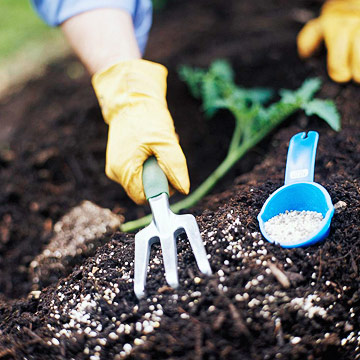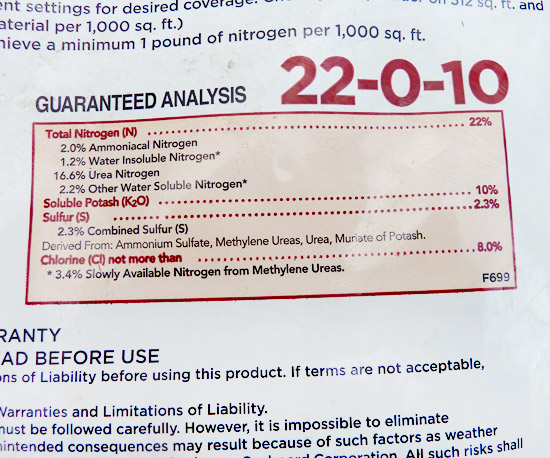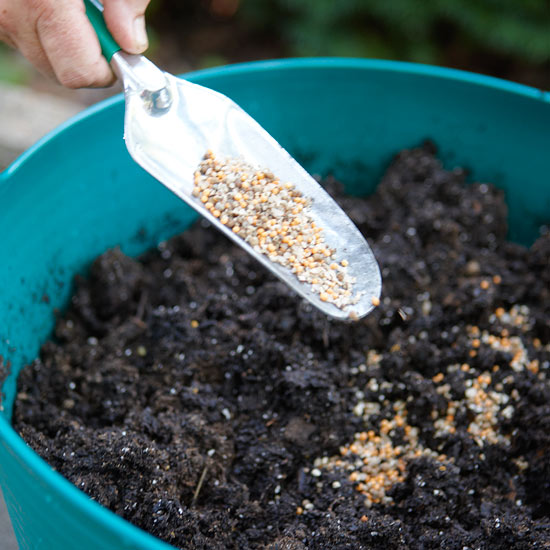






Fertilizing your garden can seem terribly confusing. At your garden center or home store, there may be mountains of bags and shelves of bottles. Which product is best? What's the difference between organic and synthetic? How often do you need to apply it and how much should you use at one time? What does pH have to with it? In this article, we'll take a good look at these questions and crack the N-P-K code without having to get a degree in chemistry.
It is always a good idea to start with a soil test. Do-it-yourself tests can be purchased at your local garden center, and they are fairly accurate. If you'd like a more detailed reading, send a soil sample to your local cooperative extension service. They can send you a soil testing-kit with instructions on how to collect the sample and a questionnaire to let them know how you intend to use the garden. A vegetable garden will have different nutrient requirements than a rose garden, for example. After analysis, they will send you a report and alert you to any mineral deficiencies in your soil. They will also make recommendations on how to correct them. Knowing exactly what to apply, and not using too much fertilizer, makes the small price of testing very worthwhile.
Learn more about soil testing.
continue reading below
Fertilizer Analysis
Any fertilizer you buy will have three numbers on it, such as 5-5-5. The numbers represent the N-P-K ratio -- the available nutrients contained in that fertilizer. The first number is always nitrogen (N). Nitrogen helps plants grow strong, healthy foliage. The second number is always phosphorus (P). Phosphorus helps roots and flowers develop and grow. The last number represents potassium (K). Potassium, or potash, is important for overall plant health. Your soil test will tell you what ratio of minerals is best for your garden.

Synthetic and Organic Fertilizers
Synthetic fertilizers are water-soluble and can be taken up by the plant almost immediately. This can be an advantage if plants are failing and need a quick boost. However, applying too much synthetic fertilizer can "burn" foliage and damage your plants. It's important to remember that more is not better! More plants have been killed by kindness in the form of excessive applications of synthetic fertilizers than have died because of too few nutrients. Synthetic fertilizers will do little to improve your soil's long-term fertility. Because synthetic fertilizers are highly water-soluble, they can also leach out of the soil and pollute streams and ponds, so please use them with caution.
For the long-term health of your garden, organic fertilizers and compost are the best and safest to use. Most organic fertilizers release about half their nutrients in the first season and continue to nourish your soil in subsequent years. They also improve your soil's structure and ability to hold moisture and nutrients. Sandy soil in particular can benefit from the addition of organic fertilizers, or from the use of organic matter such as well-rotted compost and manure. Overfertilizing with organic fertilizers is virtually impossible, and best of all, it is always safe for people and pets.
Now, for a little bit of chemistry, let's look at soil pH. The pH, or Potential Hydrogen, of your soil measures whether your soil is acidic (pH <6), neutral (pH 6-7), or alkaline (pH >7). Some plants have evolved to grow in acidic soil, including azaleas and blueberries. Some plants prefer a soil that's alkaline, sometimes called sweet, such as lilacs and clematis. When you have your soil tested professionally, the lab will tell you the pH of your soil. Even if proper nutrients are present in the soil, some nutrients cannot be absorbed by plants if the soil pH is too high or too low. Your local cooperative extension service will take your soil's pH into consideration when making recommendations.
Timed-Release Fertilizers
Most synthetic, or traditional, fertilizers release their nutrients all at once. But some products are formulated to act more like organic products by releasing nutrients slowly into the soil over time. Read the packaging directions to determine how long a product can be expected to continue to effectively fertilize your plants.
Do You Need to Fertilize?
If you have decent soil, you probably don't have to fertilize. But fertilizing does give plants a boost and can be especially helpful for annuals or vegetables. Periodically fertilizing your lawn also helps it grow thicker and crowd out weeds. That said, container gardens in particular benefit from fertilizing, because their potting mix doesn't naturally replenish nutrients as soil does.
Copyright © www.100flowers.win Botanic Garden All Rights Reserved